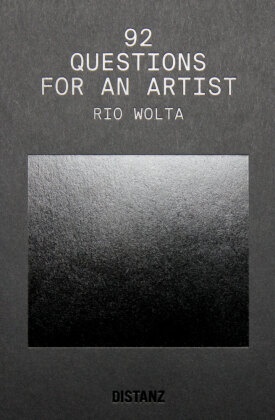
92 Questions for an Artist - Rio Wolta
| Verlag | Distanz Verlag |
| Auflage | 2024 |
| Seiten | 188 |
| Gewicht | 85 g |
| Artikeltyp | Englisches Buch |
| ISBN-10 | 3954766736 |
| EAN | 9783954766734 |
| Bestell-Nr | 95476673A |
Ein Fragenbuch für die Kunstwelt
"Who is the first person you show a finished work to?" "How much chaos is there in your work?" "How do you maintain your curiosity?" "What scares you in your working life?" "Do you think your work needs to be explained?" "What is your most common mistake?"
Der Komponist, Musiker und Regisseur Rio Wolta (geb. 1988 in Zürich, lebt und arbeitet in ebenda) hat ein Fragenbuch geschrieben, das zu einem Dialog über das künstlerische Schaffen und dessen Bedingungen einlädt. 92 Questions for an Artist ist ein Fragebogen im Kleinformat für Künstler_innen aller Disziplinen - formuliert in Shanghai, Tiflis und Zürich und zu einer Zeit der Polykrise (Adam Tooze), in der nichts bleibt, wie es war, und in der weltpolitische Ereignisse auch die Kunstwelt umkrempeln: in einer Zeit also, in der sich elementare Fragen wieder aufdrängen und in der wir wieder mehr hinterfragen müssen, um zu verstehen.
A Book of Questions for the Art World
"Who is the first person you show a finished work to?" "How much chaos is there in your work?" "How do you maintain your curiosity?" "What scares you in your working life?" "Do you think your work needs to be explained?" "What is your most common mistake?"
The composer, musician, and director Rio Wolta (b. Zurich, 1988; lives and works in Zurich) has written a book of questions that invites the reader to a dialogue about creativity and the conditions that sustain it. 92 Questions for an Artist is a pocket-size questionnaire for creative minds across disciplines-written in Shanghai, Tbilisi, and Zurich and during a time of polycrisis (Adam Tooze), when nothing has stayed the way it was and global political events have turned the art world, too, upside down: a time, that is to say, that has brought back fundamental concerns with fresh urgency and that challenges us to ask more probing questions if we want to understand.
